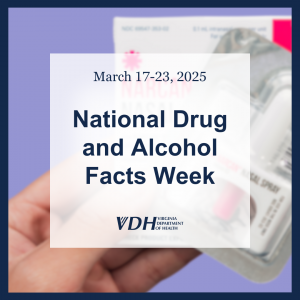National Nurses Week is May 6-12, 2025
During this week, we honor the service and commitment of public health nurses across the Commonwealth.
There’s never been a more exciting time to be part of public health in Virginia. Communities are working hard to tackle a variety of complex public health challenges. Innovative solutions are needed to help communities stay safe and healthy. Public Health Nurses (PHNs) are a critical part of that solution. As a PHN, no two days are alike. In this specialty, we use our clinical skills and public health knowledge to make significant impacts across family groups, communities, and larger community systems. The work of public health nursing is deeply rooted in prevention, program development/evaluation, community engagement, advocacy, and education. Whether a nurse is providing services out in the community, within the walls of the health department, or at the Central Office; we all serve a critical role in preventing disease and promoting health.
Kyndra Jackson, DNP, MPH, RN-BC
Director, Public Health Nursing
Virginia Department of Health
Virginia PHNs are committed to protecting and promoting an environment of healthy behaviors through education, partnership, prevention and response. They are vital to agency services across both the Central Office and local health districts. They are made up of registered nurses (RNs), licensed practical nurses (LPNs), and other specialized healthcare professionals. The responsibilities of Virginia PHNs are varied and long reaching. They can include:
- Review the quality of public health services.
- Plan, investigate and respond to public health emergencies.
- Educate populations about healthy lifestyle choices.
- Design and carry out evaluation plans for research and policy development.
- Screen and track communicable diseases to prevent outbreaks.
In addition to the varied responsibilities, PHNs are ingrained throughout most programs at local health departments. PHN staff can be found on a daily basis helping meet the needs of patients on nutrition, maternal health, sexual health, and more.
What’s Your Nursing Superpower?
Each year, VDH staff nominates PHNs that they work with to be the VDH Nurse of the Year. Each district will select a nurse as the district winner. The district winner will go on to compete at the region level. Winners are then selected for each respective region. Once regional winners are selected, a panel votes on which regional winner is to be named the VDH Nurse of the Year for all of Virginia. Each 2025 regional winner and the 2024 Nurse of the Year were asked what their nursing superpower is. See their responses and learn about their work.
Thank a Nurse
During this National Nurses Week and the rest of the year, take a moment to thank the next nurse you see for their hard work and dedication that they give through their craft and to their patients.
Happy National Nurses Week 2025!







